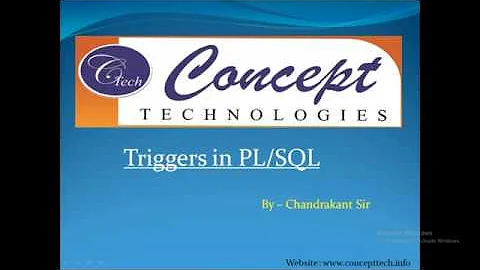Disable a trigger from a trigger Oracle
You can almost certainly disable one trigger from another using an EXECUTE IMMEDIATE statement:
EXECUTE IMMEDIATE 'ALTER TRIGGER trigger_name_here DISABLE';
However, you definitely shouldn't be using triggers for application logic. It's a messy business, not least due to the fact that triggers aren't guaranteed to fire in order, but also because of the kind of "problem" you're experiencing.
It would be much easier and significantly safer to move all of the functionality you described to a stored procedure or package, and use triggers only where necessary for validation purposes.
Related videos on Youtube
Dave Clarke
Working in my role as Lead Developer at Squared Up, my primary responsibility is leading and growing web projects using a wide range of technologies and architectures. But working for a startup means my work spans multiple areas of the business including both engineering (C#/.NET, HTML5/CSS/JS) and marketing (graphic & web design). Additionally, I have a particular focus on UI/UX, both in our core product and for other projects across the entire business. Alongside Squared Up, and for the past seven years, I've worked as a contract web developer and graphic designer providing both graphic and web design services including logo, print media, book layout as well as full stack website development. Contact me at [email protected] for info regarding freelance development or design opportunities.
Updated on September 15, 2022Comments
-
Dave Clarke over 1 year
I've stumbled on a situation where I need to disable a trigger from a trigger before doing an update, and then renable it.
Basically, I have two tables:
TIME_SLOTShas fields such as start time, end time, to set the time slot for a programme as well as programme ID (foreign key) to specify which program.PROGRAMMEScontains a list of all the different available programs & their details. Also contains a duration.
I have an existing trigger that, when updating or inserting to
TIME_SLOTS, the trigger lookups the duration fromPROGRAMMESand ensures that End Time = Start Time + Duration.I also want to add a new trigger that updates the End Time in
TIME_SLOTSwhen changing the duration inPROGRAMMES.I have set these two triggers up, but when changing the duration I get:
One error saving changes to table "SE217"."PROGRAMMES": Row 1: ORA-04091: table SE217.PROGRAMMES is mutating, trigger/function may not see it ORA-06512: at "SE217.SCHEDULES_VALID_TIMES", line 19 ORA-04088: error during execution of trigger 'SE217.SCHEDULES_VALID_TIMES' ORA-06512: at "SE217.UPDATE_END_TIME", line 5 ORA-04088: error during execution of trigger 'SE217.UPDATE_END_TIME'This is obviously because when I change the duration, the 2nd trigger goes to update the end time in
TIME_SLOTS. The trigger onTIME_SLOTSfires and looks up the duration - the duration is mutating and I get the error as above.It seems to me that when I update the
TIME_SLOTSrow with the newly calculated end time, I should just disable the trigger before and renable after the update - but as this is trigger I can't alter a trigger...Any ideas?
EDIT: I had a thought that I could set a global variable and check this var in the trigger that I don't want to run etc - but wasn't sure how best to implement?
-
 Ben about 11 yearsNo, you can't store triggers in a package but you should have warnings flashing in front of your face. Disabling triggers inside triggers is never the correct option and the error you're getting is indicative of not having a properly normalised database. @Egor is suggesting that you remove all the logic from your triggers and place it in a package instead, which is often the way around this error.
Ben about 11 yearsNo, you can't store triggers in a package but you should have warnings flashing in front of your face. Disabling triggers inside triggers is never the correct option and the error you're getting is indicative of not having a properly normalised database. @Egor is suggesting that you remove all the logic from your triggers and place it in a package instead, which is often the way around this error. -
 David Aldridge about 11 yearsYou're doing two unpopular and generally frowned-on things here: using triggers for anything other than auditing activities, and storing redundant data (ie denormalising).
David Aldridge about 11 yearsYou're doing two unpopular and generally frowned-on things here: using triggers for anything other than auditing activities, and storing redundant data (ie denormalising).
-
Dave Clarke about 11 yearsI sort of understand what you mean but don't really get how to implement this. Surely I need a trigger to update the other table when the first gets changed? Are you suggesting calling the procedure in the trigger or?
-
Ben about 11 yearsWhat we're all suggesting is that instead of directly issuing an INSERT or UPDATE statement against the first table and then relying on a trigger to update the second, you should simply call a stored procedure to INSERT/UPDATE both tables as necessary and not use triggers for this purpose at all.
-
Bob Jarvis - Слава Україні almost 6 years@swiss196: what we're suggesting is that you have a procedure which you call which implements all the logic needed to update your data, including cross-table updates, etc. The number of ways this kind of multi-trigger logic can go wrong are astronomical. For example, consider how this will work in a multi-transaction environment. If you think a mutating table issue is difficult to correct, I will absolutely guarantee that keeping your triggers coordinated is going to be worse. Best of luck.






